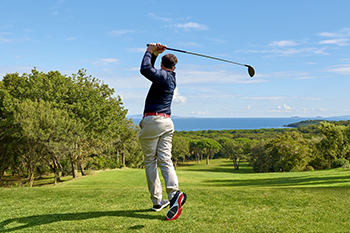
Golf may seem like a low-impact sport, but the repetitive motions and uneven terrain can lead to ankle injuries. One common cause is the rotational stress placed on the ankle during the golf swing, which can strain ligaments and tendons. Walking on uneven surfaces, such as bunkers and hills, increases the risk of missteps that may lead to sprains or fractures. Overuse from frequent play can contribute to inflammation and chronic pain. Common types of ankle injuries in golf include sprains, which occur when ligaments are stretched or torn, and tendonitis, which results from irritation of the tendons. Stress fractures can develop from repetitive impact, while instability may arise from weakened ligaments. If you enjoy playing golf and have sustained a foot or ankle injury, it is suggested that you consult a podiatrist who can offer appropriate treatment solutions, enabling you to return to your desired game.
Sports related foot and ankle injuries require proper treatment before players can go back to their regular routines. For more information, contact the foot specialists of Academy Foot and Ankle Specialists. Our doctors can provide the care you need to keep you pain-free and on your feet.
Sports Related Foot and Ankle Injuries
Foot and ankle injuries are a common occurrence when it comes to athletes of any sport. While many athletes dismiss the initial aches and pains, the truth is that ignoring potential foot and ankle injuries can lead to serious problems. As athletes continue to place pressure and strain the area further, a mild injury can turn into something as serious as a rupture and may lead to a permanent disability. There are many factors that contribute to sports related foot and ankle injuries, which include failure to warm up properly, not providing support or wearing bad footwear. Common injuries and conditions athletes face, including:
- Plantar Fasciitis
- Plantar Fasciosis
- Achilles Tendinitis
- Achilles Tendon Rupture
- Ankle Sprains
Sports related injuries are commonly treated using the RICE method. This includes rest, applying ice to the injured area, compression and elevating the ankle. More serious sprains and injuries may require surgery, which could include arthroscopic and reconstructive surgery. Rehabilitation and therapy may also be required in order to get any recovering athlete to become fully functional again. Any unusual aches and pains an athlete sustains must be evaluated by a licensed, reputable medical professional.
If you have any questions please feel free to contact our offices located in Southlake, Keller (Fort Worth), Hurst, North Richland Hills, Flower Mound, Argyle, and Denton, TX. . We offer the newest diagnostic and treatment technologies for all your foot and ankle needs.
